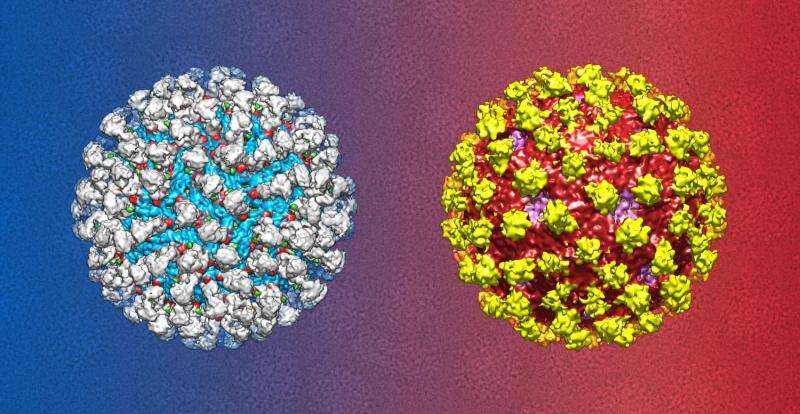Study could lead to vaccines and treatment for dengue virus

Researchers at Vanderbilt University and the National University of Singapore have determined the structure of a human monoclonal antibody which, in an animal model, strongly neutralizes a type of the potentially lethal dengue virus.
The finding, reported today July 2 in the journal Science, could lead to the first effective therapies and vaccines against dengue, a complex of four distinct but related mosquito-borne viruses that infect about 390 million people a year and which are a leading cause of illness and death in the tropics.
"Scientists in the antibody discovery group of the Vanderbilt Vaccine Center continue to make great strides in developing novel antiviral drugs, such as this human antibody that not only kills dengue virus but also prevents enhanced dengue disease," said co-corresponding author and center director James Crowe Jr., M.D., Ann Scott Carell Professor.
The four "serotypes" of dengue are distinguished by different antigens, or proteins on the viral envelope that elicit immune responses. What makes dengue so challenging, and so dangerous, is that antibodies generated against one serotype do not protect against the others.
In fact, they actually can enhance infection by a second serotype, a process known as antibody-dependent enhancement (ADE) of infection. Sequential infections increase the risk for dengue hemorrhagic fever and dengue shock syndrome, characterized by fever, vomiting, internal bleeding and potentially fatal circulatory collapse.
The researchers previously generated human monoclonal antibodies in the lab against a complex epitope, or antigenic portion of the viral envelope. In the current study, they used cryo-electron microscopy to freeze samples at very low temperatures so they could visualize antibody-antigen binding almost down to the atomic level.
In this way they were able to identify a human monoclonal antibody against dengue virus type 2 (DENV2) that "locked" across an array of envelope proteins. In a mouse model, this prevented the virus from fusing to its target cell, thus it prevents infection.
The antibody also was remarkable in that it has a second major function - it blocks the binding of the other class of antibodies that otherwise would enhance infection.
This specific "epitope," or portion of the envelope proteins elicits a specific immune response, thus it is a potential target for the development of dengue vaccines and therapeutics, the researchers concluded.
More information: Cryo-EM structure of an antibody that neutralizes dengue virus type 2 by locking E protein dimers, www.sciencemag.org/lookup/doi/ … 1126/science.aaa8651




















